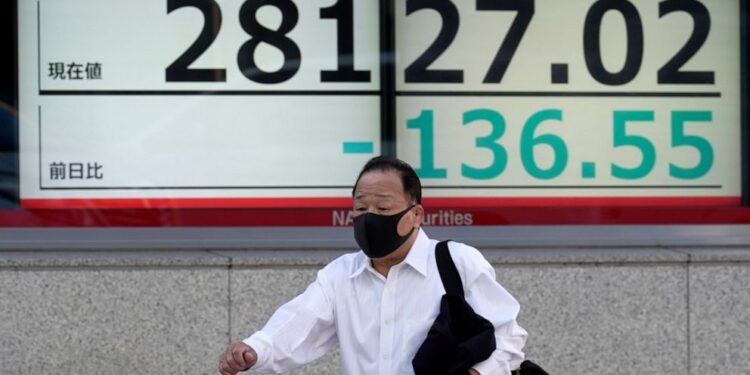Asian shares are mixed as momentum fades from last week’s rally on Wall Street amid varied sentiments about coronavirus restrictions easing in China and global interest rate increases
Asian shares were mixed in Monday trading as momentum faded from last week’s rally on Wall Street amid varied sentiments about coronavirus restrictions easing in China and global interest rate increases.
Benchmarks fell in Japan, Australia and South Korea, while rising in Hong Kong but being little changed in Shanghai. Analysts say some investors are being cheered by signs inflation is abating in the U.S. earlier than initially thought, while they warn factors to remain that could refuel inflation, including geopolitical risks.
“But it is far too hasty to declare a decisive conclusion to inflation risks,” said Venkateswaran Lavanya at Mizuho Bank.
Japan’s benchmark Nikkei 225 slipped nearly 0.1% in afternoon trading to 28,028.74. Australia’s S&P/ASX 200 edged down nearly 0.2% to 7,146.30. South Korea’s Kospi lost 0.1% to 2,480.24. Hong Kong’s Hang Seng added 1.7% to 17,615.00, while the Shanghai Composite was little changed inching down less than 0.1% to 3,084.72.
“We also have the Democrats holding the Senate while the Republicans look likely to control the House. Policy paralysis at a time of economic crisis is not a good look for what may lay ahead over the next two years. The current stock rally may have only days to run,” said Clifford Bennett, chief economist at ACY Securities, referring to the U.S. midterm election results.
Wall Street closed last week with a rally, amid hopes inflation pressures had eased. That would make the Federal Reserve less likely to keep raising interest rates. But some analysts said the Wall Street rally was overdone.
The S&P 500 rose 36.56 points, or 5.5%, for its best day in more than two years, to 3,992.93. Its 5.9% gain for the week was its third in the last four and its biggest since June.
The Dow rose 32.49, or 0.1%, to 33,747.86, and the Nasdaq climbed 209.18, or 1.9%, to 11.323.33. Both also notched hefty gains for the week.
Markets are getting a boost from China’s relaxing some of its strict anti-COVID measures, which have been hurting the world’s second-largest economy. Easing of restrictions translates to potentially more growth in China, a definite plus for the Asian region.
A report last week showed inflation in the United States slowed by more than expected last month. The Fed has already lifted its key overnight interest rate to a range of 3.75% to 4%, up from basically zero in March. The likely scenario is still for further hikes into next year.
In energy trading, benchmark U.S. crude lost 61 cents to $88.35 a barrel. U.S. crude gained 2.9% to $88.96 per barrel Friday. Brent crude, the international standard, fell 56 cents to $95.43 a barrel.
In currency trading, the U.S. dollar rose to 139.48 Japanese yen from 138.76 yen. The euro cost $1.0304, down from $1.0356.
Source: abcNEWS




Recent Comments